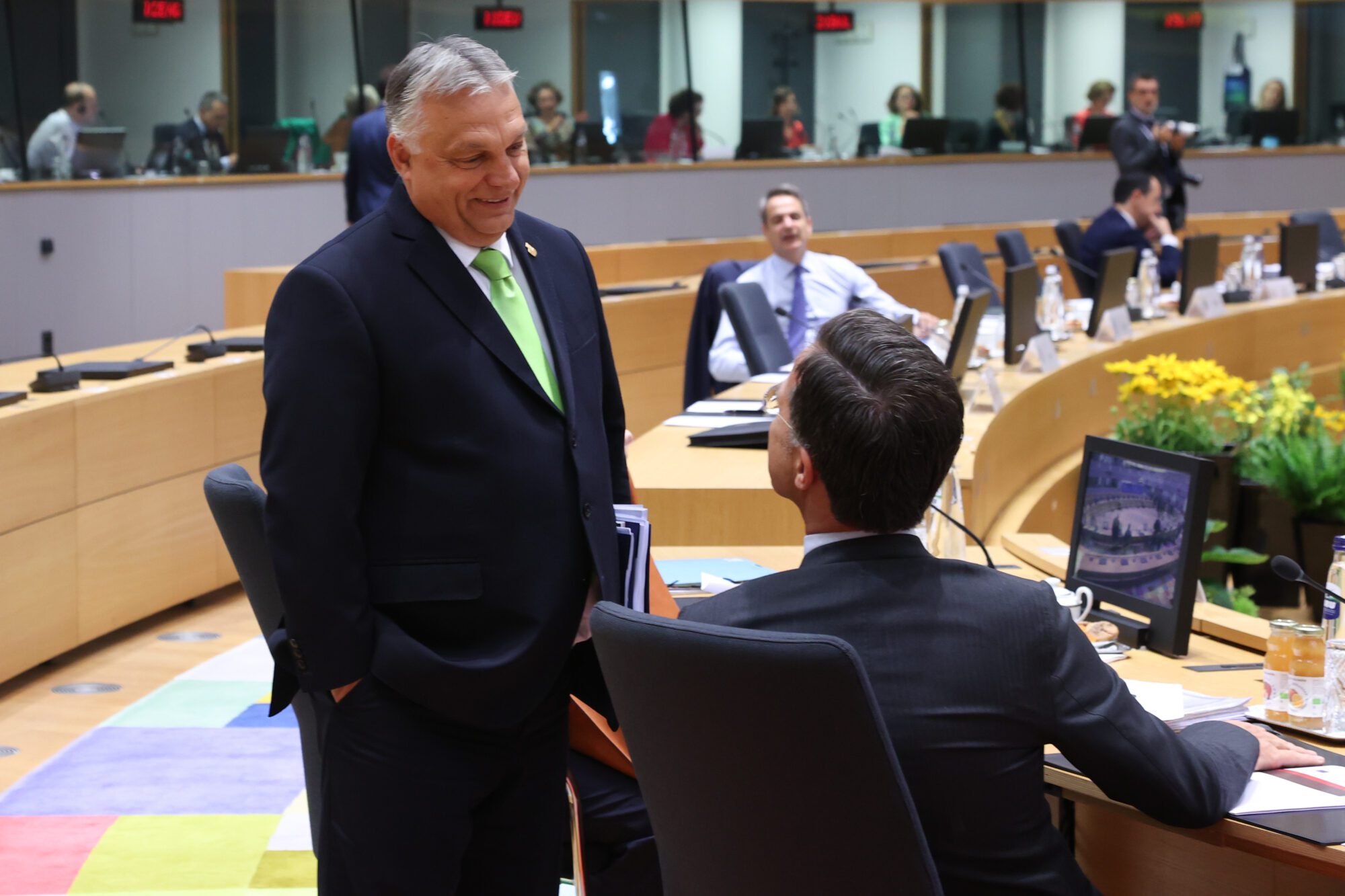
Hungarian prime minister Viktor Orbán with Mark Rutte, then-prime minister of the Netherlands, at the European Council
Roundtable in European Council in June of 2023.
Photo copyright: European Union
Despite over two-thirds of NATO member states having already signaled their support for outgoing Dutch PM Mark Rutte to replace Secretary-General Jens Stoltenberg after the end of his term in October, Rutte still needs to convince around ten, mostly Eastern and Central European members to have unanimous support. And that might be a problem.
Rutte—a nominally center-right, but notoriously liberal prime minister whose party suffered a humiliating defeat last November after ruling the country for over a decade—spent the last couple of years insulting the Hungarian government and advocating for kicking Budapest out of the EU.
Given that history, Hungarian Foreign Minister Péter Szijjártó’s announcement at a press conference on Tuesday should come as no surprise: Budapest will not back Rutte’s candidacy for the NATO top job.
“We certainly cannot support the election of a man to the position of NATO’s Secretary-General who previously wanted to force Hungary ‘on its knees,’” Szijjártó stated.
The foreign minister referred to an episode from June 2021, when Budapest passed its controversial anti-pedophilia bill which, along with introducing harsher punishments and creating a sex offender registry, also prohibited the portrayal of gender transformation and homosexuality in elementary schools as well as prime-time TV programs.
A lot of the EU member states then criticized the law by calling it ‘anti-LGBT legislation,’ and 17 of the 27 leaders—including Merkel, Macron, and Rutte—signed a joint statement condemning the law for allegedly conflating pedophilia with homosexuality.
That was also the time when Mark Rutte famously said that if the law is repealed, “Hungary has no place in the EU anymore.” The Dutch PM—apparently, not considering NATO top jobs then—truly did not hold back:
It is my intention, on this point, to bring Hungary to its knees. They have to realize they are either a member of the European Union and so a member of the community of shared values that we are … or get out.
🚫 Addressing the potential @NATO Secretary-General candidacy of @MinPres Mark Rutte, who criticized Hungary's policies, FM Szijjártó stated the Hungarian government could not support a nominee who had sought to pressure Hungary, referring to Rutte’s earlier statements about… pic.twitter.com/XG7RstFDR8
— Zoltan Kovacs (@zoltanspox) March 5, 2024
But after three years and a lawsuit by the Commission at the European Court of Justice (ECJ), the bill is still in place and enjoys popular support in Hungary. It is not about discrimination, the government says, since it doesn’t affect adults at all, only the sexual education of children.
“The debate is not about adults in relation to gender, but about children, about who is given authority in sex education: schools or parents,” Prime Minister Viktor Orbán said in an interview. “Children mustn’t be allowed to receive any kind of instruction related to sexual identity in kindergarten or school without the permission of their parents. That’s a red line!”
Now, unless he finds a way to apologize to Budapest, Rutte’s undiplomatic comments might have cost him the NATO leadership. We don’t know which other countries are still on the fence about nominating Rutte, but most of them are most likely on the eastern flank of the alliance.
Eastern European countries are not only the ones who actually managed to allocate 2% of their GDP on defense spending—as opposed to most Western European nations, including the Netherlands, which, until now, seems to have ignored the rule—but have also been complaining that every Secretary-General in the past has hailed from the West. Rutte, if elected, would be the fourth Dutchman to lead the Atlantic alliance since its founding.
Several alternatives were floated in previous months from the eastern half of the continent as well. One was Estonian PM Kaja Kallas, but many consider her too hawkish toward Russia, which might complicate things after the war. Polish Foreign Minister Radosław Sikorski could have been an obvious choice, considering Warsaw’s rapidly increasing military might and strategic importance, but he’s rumored to receive the EU’s newly proposed defense portfolio after the election.
Rutte’s only challenger from the east might be Romanian President Klaus Iohannis, who’s recently announced his interest to fill in Stoltenberg’s boots, with the alleged support of a handful of neighboring countries behind him. Romania is the second largest country in East Central Europe and is strategically located on the banks of the Black Sea, and Iohannis has proved to be a firm but not brash supporter of Ukraine.
Iohannis’ only problem is that Rutte already has the most important green light: the White House’s. Depending on how serious that choice is, Washington might put every remaining fence-sitter under a bit of pressure until they come around. Convincing Hungary, though, might prove tricky.
